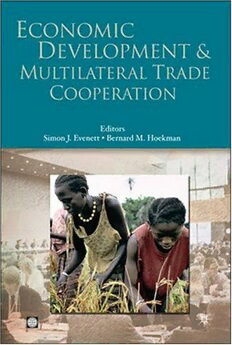
Economic Development and Multilateral Trade Cooperation PDF
526 Pages·2005·2.429 MB·English
Most books are stored in the elastic cloud where traffic is expensive. For this reason, we have a limit on daily download.
Preview Economic Development and Multilateral Trade Cooperation
Description:
This is a critical period for the WTO and for realizing the potential of trade as a driver of growth and poverty reduction. It is time for good intentions to be translated into solid multilateral agreements that promote development, and it is high time that the rich countries tore down their barriers. But trade agreements by themselves cannot guarantee growth and poverty reduction: aid for trade and internal reforms are needed too. On all this, detail matters and trade agreements are complex. This book provides an up-to-date, clear, and thoughtful analysis of these crucial issues. It should be compulsory reading for all those who are concerned with taking forward the agenda on trade and development in a constructive way. - Sir Nicholas Stern, FBA Second Permanent Secretary to Her Majestys Treasury Head of the Government Economic Service, U.K. How can international trade agreements promote development and how can rules be designed to benefit poor countries? Can multilateral trade cooperation in the World Trade Organization (WTO) help developing countries create and strengthen institutions and regulatory regimes that will enhance the gains from trade and integration into the global economy? And should this even be done? These are questions that confront policy makers and citizens in both rich and poor countries, and they are the subject of Economic Development and Multilateral Trade Cooperation. This book analyzes how the trading system could be made more supportive of economic development, without eroding the core WTO functions.
See more
The list of books you might like
Most books are stored in the elastic cloud where traffic is expensive. For this reason, we have a limit on daily download.
